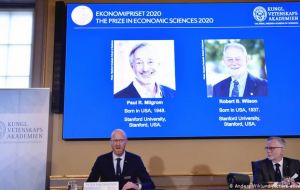MercoPress. South Atlantic News Agency
Two US academics and experts on auctions, awarded the Nobel Economics
 Paul Milgrom and Robert Wilson came up with formats for selling interrelated items simultaneously
Paul Milgrom and Robert Wilson came up with formats for selling interrelated items simultaneously United States academics Paul Milgrom and Robert Wilson won the 2020 Nobel Economics on Monday for work on auctions hailed as benefiting buyers and sellers around the world of everything from fishing quotas to aircraft landing slots.
Among the insights of the two Stanford University economists is an explanation of how bidders seek to avoid the so-called “winner’s curse” of over-paying, and what happens when bidders gain a better understanding of their rivals’ sense of value.
“Auctions are everywhere and affect our everyday lives. This year’s Economic Sciences Laureates, Paul Milgrom and Robert Wilson, have improved auction theory and invented new auction formats, benefiting sellers, buyers and taxpayers around the world,” the Nobel Prize’s official website tweeted.
Milgrom and Wilson notably came up with formats for selling interrelated items simultaneously. In 1994, U.S. authorities used one of their auction designs to sell radio frequencies to telecom operators, a move since copied in other countries.
In a statement, Stanford, which with Milgrom and Wilson now counts 19 living Nobel laureates, said their design had been used worldwide to allocate over US$100 billion of licenses
Wilson showed that rational bidders tend to place bids below their own best estimate of what he called the “common value” - that is, when the value of an item is deemed to be the same for everyone - for fear of paying too much.
Wilson showed that rational bidders tend to place bids below their own best estimate of what he called the “common value” - that is, when the value of an item is deemed to be the same for everyone - for fear of paying too much.
Milgrom complemented that with theories on “private values”, when the perceived value of something differs from bidder to bidder. He demonstrated that an auction format will give the seller higher expected revenue when bidders learn more about each other’s estimated values during the bidding process.
Speaking to reporters by telephone, Wilson welcomed the “happy news” of the award and revealed that his own personal experience of auction participation was limited. “Myself, I have never actively participated in an auction,” the 83-year-old Wilson said. “My wife points out that we bought ski-boots on eBay - I guess that was an auction.”
Milgrom, 72, said that Wilson, who lives across the street from him in Stanford, California, came to knock on his door in the early morning hours to tell him of their shared award as his phone had been on silent mode to let him sleep.
Asked if was anything in his research applicable to helping bidders avoid the “winner’s curse”, he said: “(It) is mostly a matter of being aware of it, knowing how to adjust...You better be sure there’s a reason that you assigned a higher value than other bidders, so that it doesn’t just mean that you’ve overestimated what the thing is worth.”
Even with all the data available today, bidders are often paying for uncertainty, Milgrom said.
“For example, if you were if you were bidding for oil on some tract and you don’t know how much oil is down there. The data isn’t going be available until you’ve drilled or if you’re bidding for radio spectrum and you want to know the value of it, it depends on what future demand is going to be or what’s going to happen with future technology,” he said.
“You have to make estimates of that that are only roughly guided by the data. If your estimates are wrong, you’re subject to the winner’s curse.”
Stanford University said Milgrom and Wilson’s auction format was credited with helping shape the entire modern telecommunications industry.
The Norwegian Nobel Committee plans to go ahead with an award ceremony, albeit in a reduced format due to the coronavirus pandemic, in Oslo on Dec. 10, the anniversary of the death of Alfred Nobel.




Top Comments
Disclaimer & comment rulesCommenting for this story is now closed.
If you have a Facebook account, become a fan and comment on our Facebook Page!